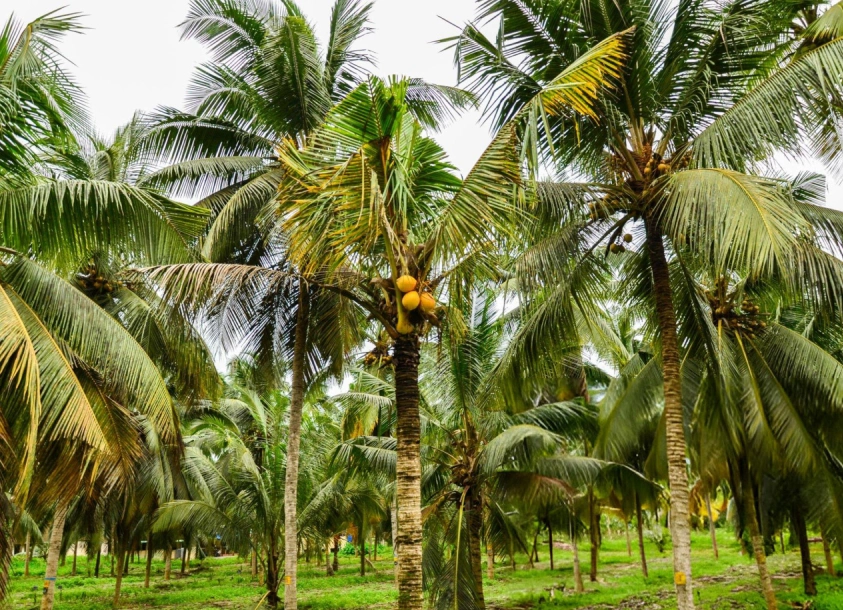Sustainable Coconut Exports from India: Farming to Freight
How Sustainable Coconut Exports from India Are Shaping Global Trade How Sustainable Coconut Exports Are Redefining Global Demand Sustainability in coconut exports has now become a hallmark for India’s emergence as a reliable supplier to international markets. As Western consumers demand ethically sourced products, Indian exporters are responding, not only in quantity but also in the ways that coconuts are grown and harvested and the products are processed and shipped. A focus on sustainability, from soil health to freight efficiency, is at the root of this movement. But providing sustainable coconut exports is not just a fad; it has become a prerequisite in order to export. There is an increasing demand from importers for coconut farming methods that are secure and environmentally friendly and that comply with international standards. While India’s tropical environment and farming variety provide a solid context for eco-friendly coconut farming, the transition towards it is a conscious decision made at every step of the process, from cultivation to harvesting, logistics, and delivery. This transition is also very important in order to keep the organic coconut supply with the environmental standards required by the markets. Improving Soil Health Through Eco-Friendly Cultivation Indian farmers adopting sustainable export farming practices are seeing the benefits begin at the ground level. Soil health is fundamental to long-term productivity and coconut quality. Exporters now encourage their network of farms to adopt these strategies: Organic inputs: Compost, green manure, and cow dung-based fertilizers reduce chemical dependency. Cover cropping: Ground cover plants like legumes prevent erosion and improve nitrogen content. Minimal tilling: Reduces soil compaction and protects natural microbial ecosystems. Crop rotation and intercropping: Planting bananas, pepper, or cocoa alongside coconut improves biodiversity. These methods not only reduce degradation but improve the long-term viability of farming plots involved in sustainable coconut exports. Climate-Conscious Approaches to Water and Energy Use As climates are increasingly erratic, resource efficiency is a necessary component of an export farming practice that is sustainable. Integrated irrigation and energy systems with lower waste and carbon footprints are gaining popularity among coconut producers with a more global outlook. Drip irrigation, rainwater harvesting, and mulching are being used in both wet and dry areas to minimize water use without affecting the quality of the yields. For energy, export companies are also encouraging the use of solar-powered copra dryers, and bio-energy options from waste coconut husks. Not only does this reduce their operating costs, but it prepares Indian suppliers to meet the demand for climate-conscious coconut exporters in markets like Europe and Japan that are very strict on environmental issues. Pest and Disease Control Without Harsh Chemicals One of the major hurdles in aligning coconut farming with sustainability goals is the use of synthetic pesticides. Export markets often have strict residue thresholds, and failure to meet them can lead to shipment rejection. Exporters are working closely with farmers to reduce chemical dependence using: Neem oil sprays and bio-fungicides derived from plant extracts Traps for rhinoceros beetles using pheromone lures Natural pest predators like ants and birds Botanical repellents and compost teas These methods are not only safer but also preserve the integrity of organic coconut supply chains. Buyers increasingly prioritize residue-free produce and traceable farm practices, making non-chemical pest control a must for export-ready farms. Packaging and Logistics for a Sustainable Supply Chain A truly sustainable model of exports doesn’t end at the farm gate. Indian coconut exporters are also innovating in terms of freight and packaging. The aim is to eliminate waste, enhance traceability, and maximize transport efficiencies. Coconut sustainable options are recyclable mesh bags, compostable liners, and less plastic. In addition, many exporters are also investing in the logistics of sustainable coconut export farming with route optimizations and low-emission refrigerated containers to keep coconuts fresh. Consolidation at the port is also an emerging tactic. Ports such as Tuticorin, Mangalore, and Cochin help quick containerization, with little need for inland transport. Less handling and fuel use for cargo directly reflect on exporters’ practices’ scorecard for green coconut export. Certifications That Support Sustainable Coconut Exports Certifications are key to accessing high-value export markets. Indian exporters are aligning with both local and global sustainability standards to reassure buyers about the eco-integrity of their supply chains. Some certifications that boost the credibility of sustainable coconut exports include: APEDA registration for export eligibility EU Organic certification for zero chemical use Fairtrade certification ensures ethical sourcing and labor Global G.A.P. for good agricultural practices Rainforest Alliance or BRCGS for traceability Exporters also use QR codes and blockchain systems to track coconuts from farm to port, offering buyers real-time traceability, a key feature of any credible sustainable export farming operation. India’s Green Edge in Coconut Exporting India’s position in the global coconut trade is no longer defined by scale alone. As markets evolve, sustainable coconut exports are becoming the benchmark of quality, trust, and global competitiveness. By investing in eco-friendly coconut farming, adopting clean logistics, and ensuring compliance with sustainability norms, Indian exporters are reshaping how the world views their produce. The global push for transparency and climate responsibility presents both a challenge and an opportunity. With the right mix of farmer support, exporter innovation, and certification alignment, India can position itself as a global leader in green coconut export practices, ensuring not just high-volume trade but high-impact sustainability that benefits producers, buyers, and the planet alike. Latest Post Our Social Media Lorem ipsum dolor sit amet consectetur. Lorem ipsum dolor sit amet consectetur. Consequat vulputate convallis eget mollis viverra nunc mi egestas. Risus facilisi nullam donec.
